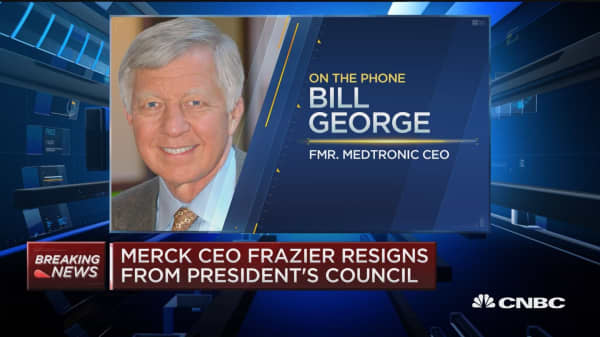Merck CEO Ken Frazier resigned from President's Trump's Manufacturing Council on Monday, saying "As CEO of Merck and as a matter of personal conscience, I feel a responsibility to take a stand against intolerance and extremism."
Later that day, two more CEOs joined him in resigning from the council – Under Armour CEO Kevin Plank and Intel CEO Brian Krzanich.
Krzanich explained his decision in a blog post, saying: "I resigned to call attention to the serious harm our divided political climate is causing to critical issues, including the serious need to address the decline of American manufacturing."
President Trump did issue a statement on Monday more strongly condemning racism as evil, saying, "those who cause violence in its name are criminals and thugs, including KKK, Neo-Nazis, White Supremacists and other hate groups…"
However, his initial knee-jerk was to attack Frazier in a tweet, saying, "he will have more time to LOWER RIPOFF DRUG PRICES!"
TWEET: Now that Ken Frazier of Merck Pharma has resigned from President's Manufacturing Council,he will have more time to LOWER RIPOFF DRUG PRICES!
Ironically, as chairman of the Pharmaceutical Research and Manufacturers of America, Frazier has been the leader in urging restraint in pharmaceutical prices, being the first company to offer transparency on its prices between 2010-2016, and calling out miscreants like Turing Pharmaceuticals' Martin Shkreli and Valeant's Mike Pearson. Commenting on President Trump's tweet, CNBC's Jim Cramer suggested that the president owed Frazier an apology.
The courageous stand these three CEOs took raises the question: When should corporate leaders speak out on vital issues? What risks do they take, such as incurring the wrath of the president?
In recent months, we have been witnessing more and more leaders taking public stands on important issues. When President Trump withdrew America from the Paris Climate Agreement in June, Jeff Immelt, then the CEO of General Electric (now chairman), tweeted, "Climate change is real. Industry must now lead and not depend on the government." CEOs Bob Iger of Disney and Elon Musk of Tesla immediately resigned from the President's Strategy and Policy Forum following that decision.
IMMELT TWEET: Climate change is real. Industry must now lead and not depend on the government.
These CEOs are walking a fine line between staying engaged by serving on presidential councils and resigning as a statement of principle over actions by public officials that run counter to their company's values and principles. In today's complex world, CEOs are looked to as standard bearers on important policy issues for their companies, while also representing multiple constituencies, often with conflicting views. It is in the nuance of making these tradeoffs that their true leadership is determined.
Given the importance of issues like health care, global trade, climate change, and corporate taxes, CEOs and their teams need to have access to the policy makers in Congress and the White House in order explain how these issues impact their businesses. At the same time they are charged with upholding the company's principles.
In Merck's case, Frazier must reflect the needs of millions of Merck's global patients and customers, as well as the interests of 55,000 employees around the world. These constituencies are highly diverse, reflecting every race, religion, and nationality, as well as gender, sexual orientation and political beliefs — all of which were cited by Frazier in his statement of resignation. Meanwhile, shareholders have their stake in the company and its financial well-being, as do many health care groups. How can CEOs like Frazier navigate these complexities?
I believe business leaders should base their stands on the company's mission and its values. If these are violated, then they have an obligation to speak publicly. Frazier felt the offense of extremists in Charlottesville this past weekend required a strong stand from the president against white supremacists and neo-Nazis, one that was not forthcoming. So did Goldman Sachs CEO Lloyd Blankfein.
Minutes after Frazier's statement and Trump's rejoinder, Blankfein posted his own tweet, quoting Lincoln, "'A house divided against itself cannot stand.' Isolate those who try to separate us. No equivalence w/ those who bring us together."
BLANKFEIN TWEET: A house divided against itself cannot stand.' Isolate those who try to separate us. No equivalence w/ those who bring us together.
If their positions are based on their company's principles, not just self-interest, then these leaders are on solid ground, even if they incur the wrath of some policy makers and constituents.
Apple's Tim Cook and Salesforce's Marc Benioff have repeatedly spoken out against discrimination against gays and anti-LGBT policies in North Carolina and Indiana. Last week, Google CEO Sundar Pichai terminated employee James Damore for his 10-page manifesto that Pichai said "crosses the line by advancing harmful gender stereotypes in our workplace," such as suggesting that women are neurotic, characterized by high anxiety and lower stress tolerance.
As the public dialogue becomes more divisive, I anticipate that more business leaders will be taking public stands on behalf of the people and organizations they represent. I admire their courage and willingness to do so. Even when we disagree with them, we should be respectful of their bravery to stand up and be counted when the issues matter the most.
Commentary by Bill George, a senior fellow at Harvard Business School, former Chairman & CEO of Medtronic, and the author of "Discover Your True North." Follow him on Twitter @Bill_George.
For more insight from CNBC contributors, follow @CNBCopinion on Twitter.




